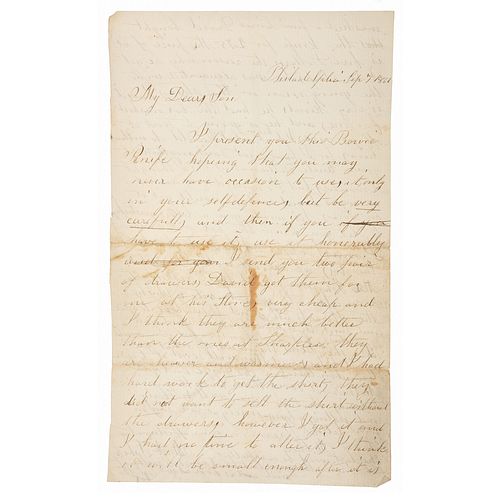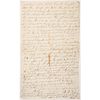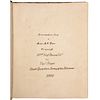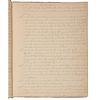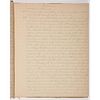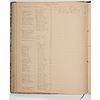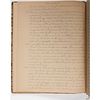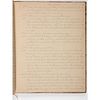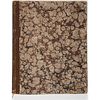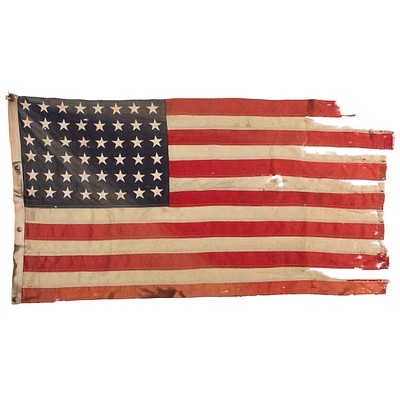Civil War Memorandum Book of Joseph SC Taber of the 23rd Pennsylvania Volunteers, with Heavy Peninsula Campaign Content Including Mention of Rebel Bal
About Seller
6270 Este Ave.
Cincinnati , OH 45232
United States
With offices in Cincinnati, Cleveland and Denver, Cowan’s holds over 40 auctions each year, with annual sales exceeding $16M. We reach buyers around the globe, and take pride in our reputation for integrity, customer service and great results. A full-service house, Cowan’s Auctions specializes in Am...Read more
Two ways to bid:
- Leave a max absentee bid and the platform will bid on your behalf up to your maximum bid during the live auction.
- Bid live during the auction and your bids will be submitted real-time to the auctioneer.
Bid Increments
| Price | Bid Increment |
|---|---|
| $0 | $25 |
| $500 | $50 |
| $1,000 | $100 |
| $2,000 | $250 |
| $5,000 | $500 |
| $10,000 | $1,000 |
| $20,000 | $2,500 |
| $50,000 | $5,000 |
| $100,000 | $10,000 |
About Auction
Jun 26, 2020
Cowan's Auctions is delighted to present the June 26 American Historical Ephemera and Photography Auction, including 55 lots devoted to the African American experience, over 175 lots dating from the Civil War Era, and more than 60 lots documenting life in the American West. Cowan's Auctions dawnie@cowans.com
- Lot Description
Civil War Memorandum Book of Joseph SC Taber of the 23rd Pennsylvania Volunteers, with Heavy Peninsula Campaign Content Including Mention of Rebel Balloon
Lot of 2. Taber, M. A. ALS, 2pp, 4.625 x 7.5 in., "Philadelphia." September 7, 1861. In this letter to his son, Mr. Taber outlines items he has arranged to have sent to Joseph, including a bowie knife, "two pair of drawers," and a shirt. He tells his son about all of the people at home who send their love, and closes the letter by instructing his son (for the second time) to be very careful not to hurt himself with the knife.
Memorandum book, approx. 7.5 x 9.5 in., containing 46 pages of war recollections and 7 additional pages of records. Bold text on first page reads, "Memorandum Book / of / Joseph S.C. Taber / Company B / 23rd Regt Penna Vols / With / Topl Engrs / Head Quarter Army of the Potomac / 1862." Though dated and written like a diary, the manuscript offered here was likely penned in the immediate years after the war rather than during the war. The Gilder Lehrman Institute curates a 167-page diary entitled, "Taber, Joseph S. C. Civil War diary of soldier in Co. B 23rd regiment Pa. Volunteers," which likely represents the actual war-date diary of Taber. Nonetheless, this handwritten account contains fascinating descriptions of Taber's service which are highlighted by the 23rd Pennsylvania Regiment's participation in the Peninsula Campaign of 1862.
Taber saw a number of interesting and unusual sights, including one recorded in an entry dated April 14, 1862. He writes, "This morning as we started out, we saw a rebel balloon go up it staid [sic] up but a short time from what I could see of it, it was quite a shabby affair."
Only four short days later, Taber had a near death experience, which he describes in detail: "I was at the time about 3 feet behind Terry and about 15 from the table, I was looking at the table when the shell struck, it was a percussion cap shell, and as it is with the majority of such shells it hung fire, I threw myself flat on my face & the dirt flew all over me, had it been a fuze shell more than likely I would not have been here to write this."
Another strange sight is recorded in an entry dated April 22nd, in which Taber also records that a Lieutenant Wagner died the previous night. After some shelling back and forth, Taber records that "a secesh came into camp to-day blind-folded with a flag of truce, he was a sergeant."
Though Taber relays a report of victory at the Battle of Fair Oaks (or Seven Pines), he records that McClellan is continuing to await reinforcements before launching any kind of attack. In an entry dated June 21, Taber writes, "the rebels try every once in a while to bring on an engagement but Genl McClellan is not ready yet, but when he is will not wait for an attack..." Less than a week later, the issue was forced when three Confederate divisions surrounded McClellan's troops and readied for attack. The resulting Battle of Gaines' Mill took place on June 27th, as part of the Seven Days' Battles. Taber records that he had never heard such firing before, but that he and his troops held their own pretty well despite the rebels having control of the battlefield.
Further attacks from the rebels continued through the following month in an attempt to push McClellan's troops farther from Richmond. In an entry from July 1st, Taber records one such attack resulting in the Battle of Malvern Hill. He writes, "The 23rd was in the fight to-day every man fired his 60 rounds of cartridges, our loss has been very slight. Five men in Co B were wounded, we had all our batteries in position on a range of hills and as the rebels moved up towards our men the batteries would open on them and mow them down like chaff before the wind..."
Perhaps the most climactic events recorded by Taber are the Battles of South Mountain and Antietam, taking place on September 14th and 17th, respectively. Though the former is often overshadowed by the latter, both battles were significant in proving the stopping power of McClellan's federal forces against Lee's rebel army in Maryland.
Taber provides a detailed account of the Battle of South Mountain in his entry dated September 14th. He writes "...the rebels had possession of the range of hills called South Mountain which is by nature a strong position, we established our lines on a range of hills opposite them...as soon as we had looked around a little Genl Pleasanton commenced to plant his batteries along the crest and in a short time the air was rent with the sounds of schreaking [sic] shells..." After a while, General Pleasanton ordered General Cox to advance on the left with his division, and as they made their way up the hill, the rebels "opened a masked battery on them," causing Cox's men to halt and lay down on the hill.
Taber then relays that "Genl McClellan came on the field and immediately ordered Lieut Bowen to carry the message to Genl Cox to commence the fight and take the mountain at all hazards. I went with him, we found Genl Cox & Staff in an open field lying down to save their precious lives for the shells were raining into the field like a hail storm..." After the order was delivered, Taber laid down in the field, holding his and the lieutenant's horses' bridles, when a shell burst behind him and chipped a piece of his horse's lip off.
Cox's troops, having gotten into line, were then ordered to charge. Taber remembers: "...in a moment the air was rent with the cheers of the brave fellows as they rushed onward a great many to their doom as it were, but all with their eye on the glorious emblem of our country the national colors..." As soon as they reached the crest of the hill, rebel musketry, shells, and grapeshot unloaded on them, announcing the commencement of the battle in earnest. "...(F)rom right to left the cannon belched forth the torrents of death and the sharp rattle of musketry was continuous along the line, when the fight commenced Lt Bowen, Col Wilcox and two minor officers with myself included made it our duty to drive in the stragglers..." Taber records an "amusing incident" when he discovered a retreating gunman with "horror depicted on his countenance to such an extent that I was very near laughing."
After fighting for about two and a half hours, Union forces succeeded in taking the summit and driving the rebels into the valley. At that point, the sound of rebel fire began to die down and Union soldiers began removing the wounded from the field while Lieutenant Bowen attended to the wounded rebels. They then rode to General McClellan's headquarters to give a full report of the battle, and along the way Taber has a strangely prescient experience. He writes that as he passed General Reno and Sturgis with their staff, who "were all dressed in gorgeous uniforms," he wondered, "...why tempt providence by exposing needlessly the lives which do not belong to them but to their country..." Upon reaching camp, Taber learned that General Reno had been killed in that night's battle.
Taber's account of the Battle of Antietam is much less detailed, calling it "in fact the hardest battle that has ever been fought during this rebellion."
The memorandum book contains many more accounts, including of a visit to Harper's Ferry where the houses "are mostly in ruins, as well as all the Government works," and of the Battle of Fredericksburg on December 13th, which is described in few details including a vague remark that the fight was "terrible."
Taber's accounts recorded here provide not only keen insights into the personal experience of a soldier at war, but also important details of key battles making up McClellan's Peninsula Campaign.Memorandum book with wear consistent with age, though all pages remain intact. Letter with spots of discoloration, creasing, and wear to edges and corners.Condition
- Shipping Info
-
Buyers are required to pay for all packing, shipping and insurance charges. Overseas duty charges are the responsibility of the successful Bidder. Be aware that for larger and/or valuable items, shipping charges can be substantial. - If there is no shipping amount on listed your invoice, you will need to make arrangements to pick up or ship your purchase through an alternative shipping company. Our shipping department can be contacted at 513.871.1670 (ext. 219) or email shipping@cowans.com. - Shipping charges include insurance for your order while in transit. If you have private insurance we will adjust your charge to include only packing and shipping. - Please allow 14 – 21 days after payment to package and ship your purchase as carefully as possible.
-
- Buyer's Premium



 EUR
EUR CAD
CAD AUD
AUD GBP
GBP MXN
MXN HKD
HKD CNY
CNY MYR
MYR SEK
SEK SGD
SGD CHF
CHF THB
THB